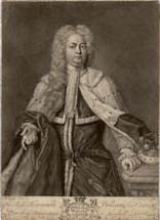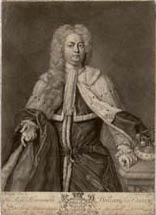
William Craven, 3rd Baron Craven
Encyclopedia

English people
The English are a nation and ethnic group native to England, who speak English. The English identity is of early mediaeval origin, when they were known in Old English as the Anglecynn. England is now a country of the United Kingdom, and the majority of English people in England are British Citizens...
nobleman
Nobility
Nobility is a social class which possesses more acknowledged privileges or eminence than members of most other classes in a society, membership therein typically being hereditary. The privileges associated with nobility may constitute substantial advantages over or relative to non-nobles, or may be...
.
He inherited his father's title and estates at the age of only eleven and made his home at Hamstead Marshall
Hamstead Marshall
Hamstead Marshall is a village and civil parish in the English county of Berkshire. Although the village name is spelt Hamstead Marshall, the alternative Hampstead Marshall was quite commonly used in the past, and remains the official name of the civil parish...
in Berkshire
Berkshire
Berkshire is a historic county in the South of England. It is also often referred to as the Royal County of Berkshire because of the presence of the royal residence of Windsor Castle in the county; this usage, which dates to the 19th century at least, was recognised by the Queen in 1957, and...
. Unfortunately, his great palace there burnt down in 1718 and his dreams of rebuilding it came to nothing. He subsequently lived at Coombe Abbey
Coombe Abbey
Coombe Abbey is a hotel which has been developed from an historic grade I listed building and former country house. It is located roughly midway between Coventry and Brinklow in the countryside of Warwickshire, England...
, Coventry
Coventry
Coventry is a city and metropolitan borough in the county of West Midlands in England. Coventry is the 9th largest city in England and the 11th largest in the United Kingdom. It is also the second largest city in the English Midlands, after Birmingham, with a population of 300,848, although...
in Warwickshire
Warwickshire
Warwickshire is a landlocked non-metropolitan county in the West Midlands region of England. The county town is Warwick, although the largest town is Nuneaton. The county is famous for being the birthplace of William Shakespeare...
. Lord Craven was involved in the formation of England's first charitable institution dedicated to the care of unwanted children
Child abandonment
Child abandonment is the practice of relinquishing interests and claims over one's offspring with the intent of never again resuming or reasserting them. Causes include many social and cultural factors as well as mental illness. An abandoned child is called a foundling .-Causes:Poverty is often a...
, the Foundling Hospital
Foundling Hospital
The Foundling Hospital in London, England was founded in 1741 by the philanthropic sea captain Thomas Coram. It was a children's home established for the "education and maintenance of exposed and deserted young children." The word "hospital" was used in a more general sense than it is today, simply...
. Although Craven never witnessed its formal beginnings, the charity was created through royal charter
Royal Charter
A royal charter is a formal document issued by a monarch as letters patent, granting a right or power to an individual or a body corporate. They were, and are still, used to establish significant organizations such as cities or universities. Charters should be distinguished from warrants and...
granted two months and one week after Craven's death, Craven is still listed on the charter as a founding Governor
Governor
A governor is a governing official, usually the executive of a non-sovereign level of government, ranking under the head of state...
.

